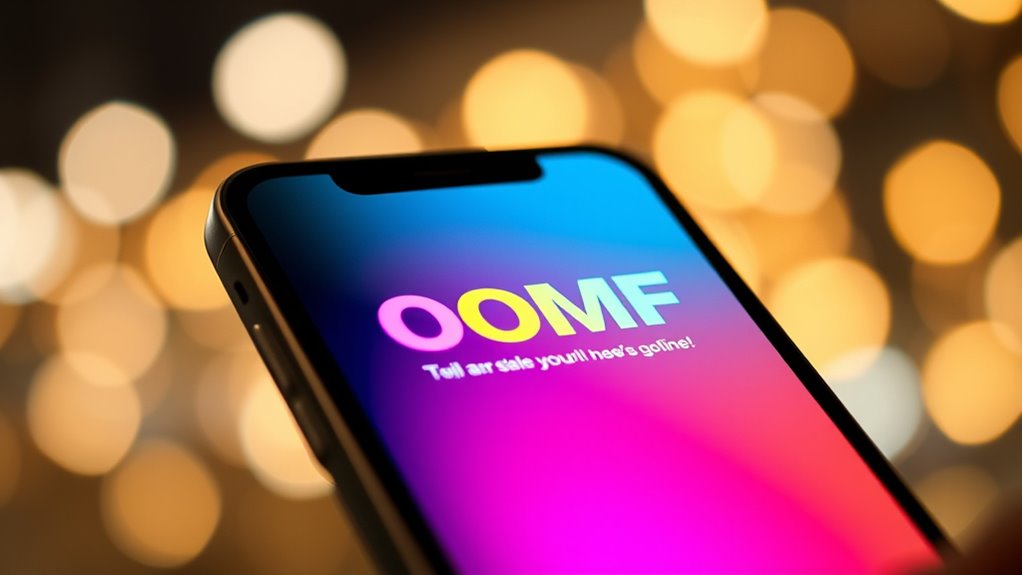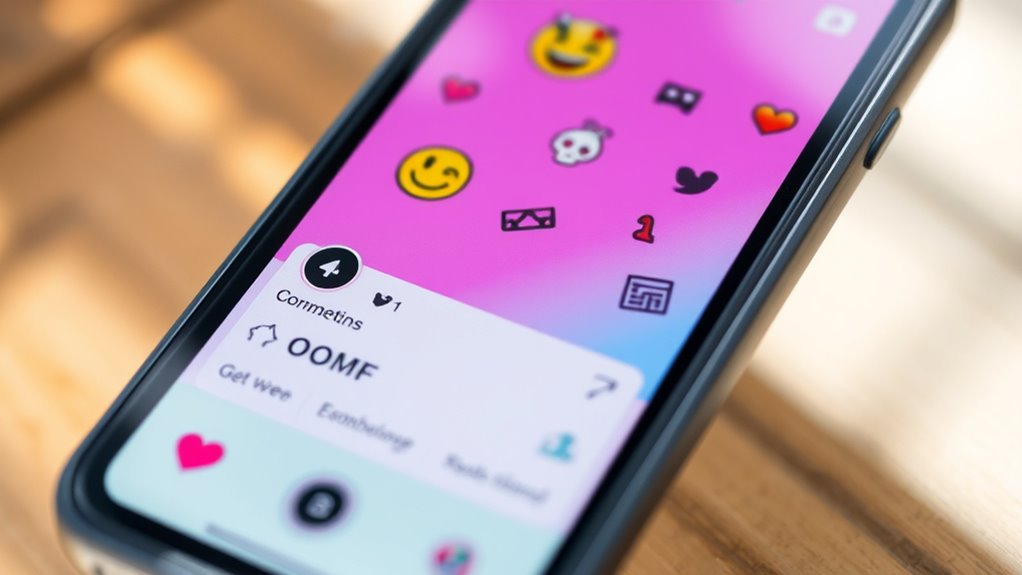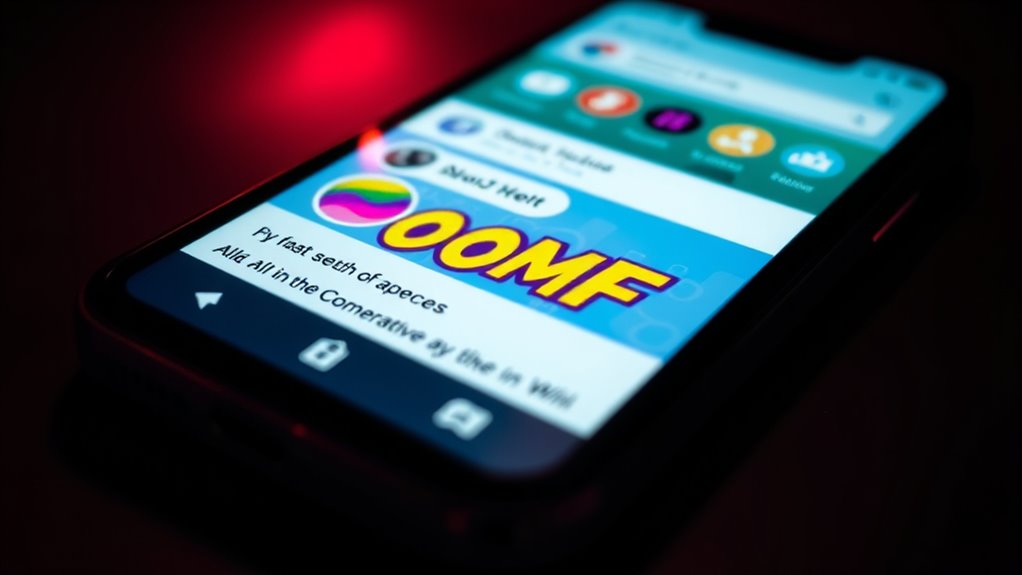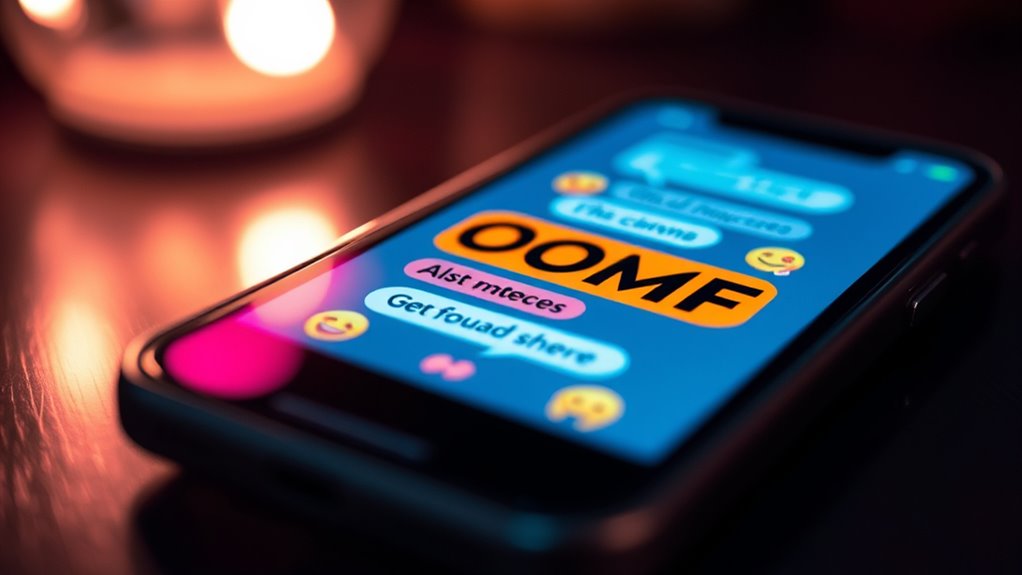OOMF stands for “One of My Followers” and is a slang term used on social media to indirectly refer to someone in your online circle. You might see it in posts or captions to add a casual, relatable vibe or share moments without naming specific people. Unlike other slang, OOMF focuses on the person behind the content. If you keep exploring, you’ll uncover more about how this term connects to online culture.
Key Takeaways
- OOMF stands for “One of My Followers,” referring to a person in a social media follower’s circle.
- It is used to casually and indirectly mention or refer to someone without naming them directly.
- Common in social media posts and captions to add a personal, humorous, or relatable tone.
- Emphasizes the individual behind the content rather than feelings or reactions.
- Originated from online communities to save space and foster social connection among followers.
The Origin and Definition of OOMF

The term OOMF stands for “One of My Followers” and originated from social media platforms like Twitter and Instagram. Its historical origins trace back to online communities where users referred to their followers in shorthand. Linguistic analysis shows that OOMF functions as an informal, abbreviated phrase that emphasizes a personal connection. This abbreviation likely developed as a way to save space and time in digital communication, especially in character-limited environments. Over time, OOMF became a common slang term used to describe someone within a follower’s social circle without specifying their identity. Its simplicity and brevity have helped it spread across various social media platforms, cementing its place in online slang lexicons. Recognizing its linguistic evolution helps explain its widespread usage in casual digital conversations.
How OOMF Is Used in Social Media Posts

Ever wondered how people incorporate OOMF into their social media posts? It’s often used to add a relatable or humorous touch, similar to pop culture references or slang comparisons. Users might caption a photo with “OOMF feeling cute today,” implying a shared vibe without revealing too much. This keeps posts casual and engaging, encouraging interaction. Here’s a quick look at common uses:
| Context | Example |
|---|---|
| Expressing a vibe | “OOMF is living her best life” |
| Sharing a moment | “Just seen this and thought, OOMF” |
| Self-deprecating humor | “OOMF, always late again” |
| Relating to followers | “You know how it is, OOMF” |
| Pop culture nods | “This song hits different, OOMF” |
Additionally, using OOMF can help build a sense of community by fostering social connection among followers.
Differentiating OOMF From Similar Internet Slang

While OOMF shares similarities with other internet slang, it’s important to understand how it differs from terms like “FOMO,” “YOLO,” or “S/O.” These phrases mainly express feelings, reactions, or sentiments, whereas OOMF specifically points to a person behind a social media post. It’s a slang distinction that helps you identify when someone’s referencing an individual indirectly, often someone you know or relate to but may not mention by name. In casual language, OOMF emphasizes the person behind the content rather than the emotion or action. Recognizing these differences allows you to interpret social media conversations more accurately and avoid confusion between slang terms that serve different purposes in digital communication. Additionally, understanding the cyber threat landscape helps contextualize how online interactions can be affected by security concerns.
Examples of OOMF in Conversation and Texting

You might notice people casually dropping OOMF into their social media or text conversations to refer to someone indirectly. It’s common in various contexts, including poetry, where writers use oomf to hint at a person without naming them directly. For example, a poem might say, “My oomf always knows,” adding mystery and intimacy. Comparing oomf and other slang, oomf often feels more personal and less casual than terms like “bae” or “crush.” Here are some examples of how you might see OOMF in conversation:
- “Did you see what oomf posted last night?”
- “I was talking about my oomf in the poem I wrote.”
- “Your oomf seems like a really cool person.”
These instances show how versatile and subtle OOMF can be in daily chats. Additionally, understanding relationship dynamics can help clarify the context in which someone might use the term.
The Evolution of Internet Acronyms: Where OOMF Fits In

Internet acronyms have rapidly evolved from simple abbreviations to complex slang that shapes online communication. Understanding the history of internet slang reveals how abbreviations like OOMF have gained cultural significance, reflecting social dynamics and community bonds. Originally, abbreviations served to save time and space in text messages, but they soon became part of a shared digital language. As online platforms grew, these acronyms took on new meanings, embodying humor, identity, and social cues. OOMF, in particular, fits into this evolution as a term that captures personal connections and curiosity about others’ lives. Its rise demonstrates how internet slang transforms from practical shorthand into tools for cultural expression, making online interactions more engaging and community-oriented. Additionally, exploring personality traits through self-understanding can deepen one’s awareness of how such slang influences identity and social interactions online.
Frequently Asked Questions
Is OOMF Considered Offensive or Inappropriate?
You might wonder if “oomf” has offensive implications, but it generally isn’t considered offensive or inappropriate. It’s a casual term used to refer to someone without revealing their identity, often in social media or texting. However, be mindful of cultural sensitivities, as some people may interpret it differently. Overall, “oomf” is a neutral, friendly way to talk about an unspecified person, with no offensive intent.
Can OOMF Be Used to Describe Someone Specific?
You can use “oomf” to describe someone specific, especially in social media slang, but it’s usually vague and non-specific. It’s a personal identity term that refers to an anonymous or unknown person, often someone you’re talking about but don’t want to name directly. Keep in mind, it’s casual and best suited for informal conversations or posts, so avoid using it in formal or professional settings.
How Popular Is OOMF Among Different Age Groups?
You’ll find that OOMF is more popular among younger age groups, especially teens and young adults, as part of social media slang. These groups use it frequently to refer to someone’s friends or followers without naming them directly. Older age groups tend to use more formal language, so OOMF isn’t as common there. Overall, it’s a slang trend that stays largely within youth-driven social media trends.
Are There Variations of OOMF Used in Different Regions?
You might think regional slang shapes OOMF, but its variations span the globe. While some regions favor casual abbreviations, others adapt OOMF into local slang, creating unique twists. These global variations reflect diverse cultures, blending familiar texting shorthand with local language quirks. So, whether you’re chatting in the US or Asia, expect slight differences, yet the core meaning remains consistent—it’s all about referencing that special someone or the person behind the screen.
What Are Common Mistakes When Using OOMF in Messages?
When using OOMF in messages, avoid common mistakes like ignoring privacy concerns or causing context ambiguity. You might assume everyone understands the abbreviation, but it can confuse some recipients, especially if they’re unfamiliar with it. Be mindful of privacy, since OOMF often refers to someone’s crush or love interest. Use it thoughtfully to prevent misunderstandings or unintended disclosures, ensuring your message stays clear and respectful.
Conclusion
Now that you know what OOMF means, you can confidently spot it in social media posts. Imagine scrolling through your feed and seeing someone say, “My OOMF just got a promotion!” Knowing that OOMF refers to “one of my followers” helps you understand the context and tone. So, next time you see OOMF, you’ll recognize it as a playful way to refer to someone in your online community, making your digital conversations more meaningful.









